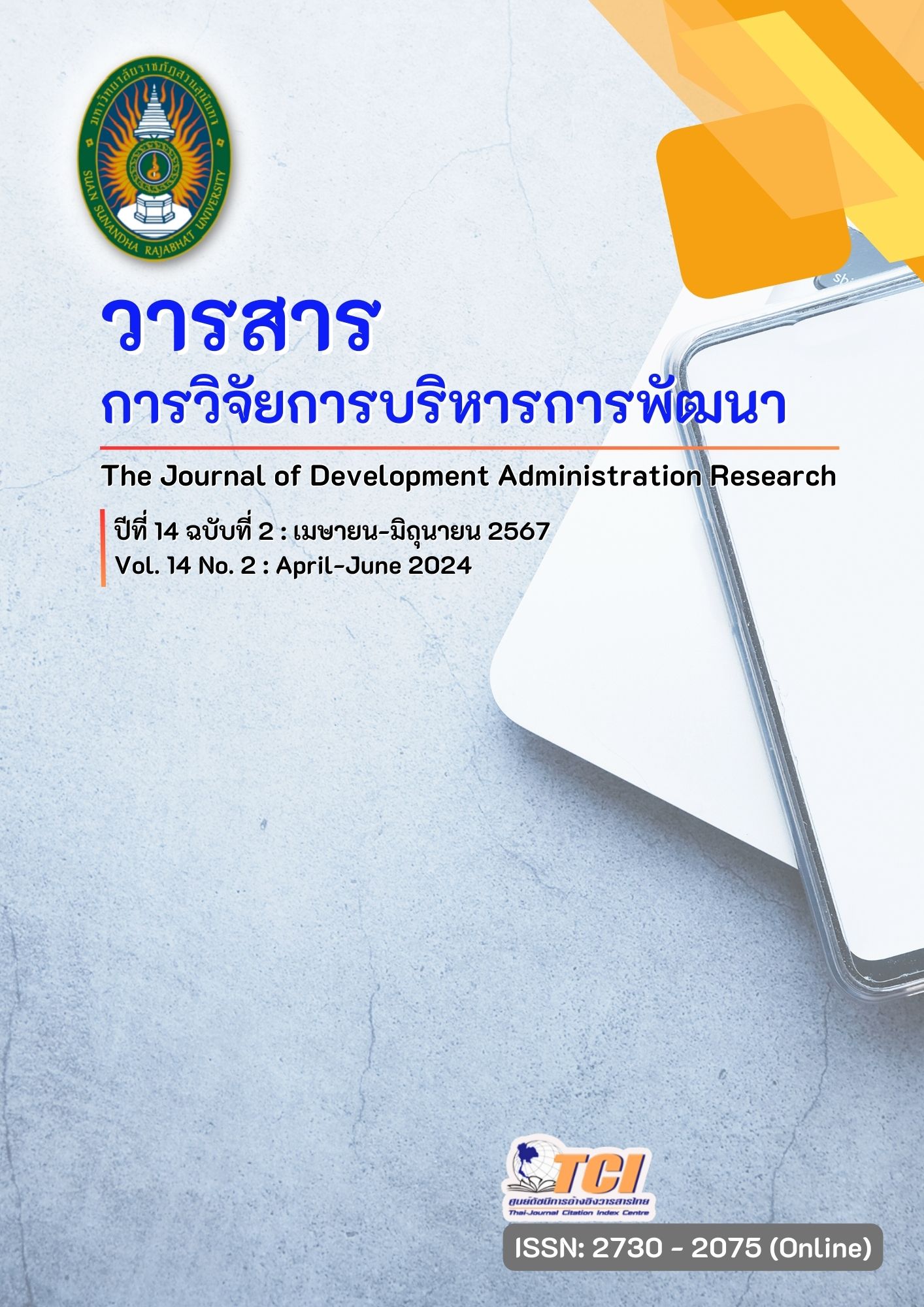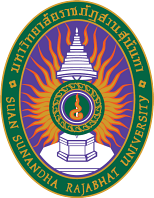Global Citizenship Education in Thai Higher Education: A Comparative Study and Guidelines for Tertiary-Level Students
คำสำคัญ:
Global Citizenship Education, Thai Higher Education, Cultural Competence, International Understanding, Pedagogical Guidelineบทคัดย่อ
This research aimed 1) to examine and compare the international context and Thai higher education (HE) in global citizenship competencies, global citizenship education (GCED), and global citizenship development projects, and 2) to propose pedagogical guidelines on global citizenship education in Thai tertiary education. After the documentary analysis and the in-depth interviews, this qualitative research relied on the IPOO model. Data were analyzed through content analysis.
The result showed: 1) the global citizenship competencies mainly lies on awareness of social inclusion, but with different viewpoints, the two contexts have their own approaches to run their global citizenship development projects and stimulate experiential learning and practices for the tertiary-level learners. Aiming at learning outcomes and guidelines, the four aspects (knowledge, skill, attitude and value) of global citizenship were focused in the international sphere while Thainess was added only in Thai higher education. Furthermore, the international and Thai Higher Education contexts mostly gear towards essential skills, awareness of civic duties, international understanding, and intercultural awareness as learning outcomes, and 2) Global citizenship education guidelines for Thai tertiary education that comes with four points including seven learning approaches and four aspects of learning outcomes and global citizenship competencies that could possibly be adapted from promoting GCED in Thai higher education.
เอกสารอ้างอิง
Chitoran, D. & Pombejr, V. (1984). The Role of Higher Education in International Understanding, Co-operation, Peace, and Human Rights. Higher education in Europe, 11(2), 1-120.
Chun, E. & Evans, A. (2016). Rethinking Cultural Competence in Higher Education: An Ecological Framework for Student Development. Jossey-Bass. https://doi.org/10.1002/aehe.20102
Cleminson, M. (2021). What is Global Citizenship Education? Global Citizen Education Solutions. https://gcedsolutions.com/2021/03/23/what-is-global-citizenship-education/
Cooke, N. (2017). Cultural Competence & Cultural Humility. Project READY: Reimagining Equity & Access for Diverse Youth. https://ready.web.unc.edu/section-1 foundations/module8/
Delors, J. (1998). Education for the twenty-first century: Issues and prospects. UNESCO publishing.
Drikx, J. (1998). Transformative Learning Theory in the Practice of Adult Education: An Overview. PAACE Journal of Lifelong Learning, 7. 1-14.
Elvin, L. (1979). International Understanding. International Review of Education, 25(2/3), 461–476. http://www.jstor.org/stable/3443744
Guo-Brennan, L. et al., (2020). Community-Based Learning for International Graduate Students: Impact and Implications. Michigan Journal of Community Service Learning.
Kennedy, M., Billett, S., Gherardi, S. & Grealish, L. (2015). Practice-Based Learning in Higher Education. Jostling Cultures, 1-13.
Kokotsaki, D., Menzies, V., & Wiggins, A. (2016). Project-based Learning: A Review of the Literature. Improving Schools, 19(3), 267-277.
Laves, W. H. C. (1949). The Universities and International Understanding. The Journal of Higher Education, 20(3), 115–120. https://doi.org/10.2307/1976552
Moon, J. (2004). A Handbook of Reflective and Experiential Learning: Theory and Practice (1st ed.). Routledge. https://doi.org/10.4324/9780203416150
Mullen, C. (1999). Reaching Inside Out: Arts-based Educational Programming for Incarcerated Women. Studies in Art Education, 40(2), 143-161.
Oxfam. (2015). Global citizenship in the classroom: A guide for teachers. Oxford Press. Retrieved 20, 12 2023, from https://oxfamilibrary.openrepository.com/bitstream/handle/ 10546/620105/edu-global-citizenship-teacher guide091115en.pdf?sequence=9&isAllowed=y
Papastephanou, M. (2023). Global Citizenship Education, Its Partial Curiosity and Its World Politics: Visions, Ambiguities and Perspectives on Justice. Citizenship Teaching & Learning, 18(2), 229–243.
PISA. (2018). Preparing Our Youth for an Inclusive and Sustainable World. Retrieved 20, 12 2023, from https:// www.oecd.org/pisa/innovation/global-competence/
PhioKham, W. (2023, 22 February). [Interview].
Power, C. (2011). Education for International Understanding and Its Contribution to Higher Education. Journal of World Universities Forum, 4 (1), 41-52.
Prapasanobon, A. (2021). Global Citizenship Education: How to Teach Students to Become Global Citizen. Retrieved 20, 12 2023, from https://thepotential.org/knowledge/global-citizenship-education/
Pratumsuwan, P. (2019). Education for Global Citizenship Development: Integrated Learning for Sustainable Development. Educational Management and Innovation Journal, 2(1), 90-103.
Promwong, N., & Sriphan, A. (2023). Guidelines for Learning Management of General Education for Promoting Global Characteristics of Undergraduate Student in Thai Higher Education Institutions. Journal of MCU Social Science Review, 12(2), 119-132.
Rakphonlamueang, C. (2019). Global Citizenship Education Development: GCED. Office of Education Research and Development, Office of the Education Council.
Sangpikul, A. (2020). Learning about the Real-world in MICE Education: The Case of Exhibition Learning from Thailand. Journal of Convention & Event Tourism, 21(3), 225-253.
Sutiarj, K. (2018). The Development of Instructional Model Based on Authentic Experiences to Enhance Self-Directed Learning Characteristics of Lower Secondary Students [Unpublished doctoral dissertation]. Dhurakij Bundit University.
Syaharuddin, S., et al. (2022). Putting Transformative Learning in Higher Education Based on Linking Capital. Journal of Education and Learning, 16(1), 58-64.
Tantirojanawong, S. (2017). Education Management Direction in the 21st Century. Veridian E–Journal, Silpakorn University (Thai Language), Humanities, Social Sciences and arts, 12(6), 2843-2854.
UNESCO. (1970). Convention on the Means of Prohibiting and Preventing the Illicit Import, Export and Transfer of Ownership of Cultural Property; adopted by the General Conference at its sixteenth session. Retrieved 20, 12 2023, from https://unesdoc.unesco.org/ark:/48223/pf00001333 78.locale=en
UNESCO. (2021). Global Citizenship Education: A Policymaking Awareness and Advocacy Handbook. (2021). Retrieved 20, 12 2023, from https://unesdoc.unesco.org/ark: /48223/pf0000377929/PDF/377929eng.pdf.multi
UNESCO. (2021). Report on the Implementation of the International Fund for Cultural Diversity (IFCD). In Conference of Parties to the Convention on the Protection and Promotion of the Diversity of Cultural Expressions, 8th. Retrieved 20, 12 2023, from https://unesdoc.unesco.org/ark:/48223/pf0000 378225.locale=en
UNESCO. (2023a). The 17 Goals: Goal 4 Ensure Inclusive and Equitable Quality Education and Promote Lifelong Learning Opportunities for All. United Nations. Retrieved 20, 12 2023, from https://sdgs.un.org/ goals/goal4#targets_and_indicators
UNESCO. (2023b). What You Need to Know about Global Citizenship Education. Retrieved 20, 12 2023, from https:// www.unesco.org/en/global-citizenship-peace-education/need-know
ดาวน์โหลด
เผยแพร่แล้ว
รูปแบบการอ้างอิง
ฉบับ
ประเภทบทความ
สัญญาอนุญาต
ลิขสิทธิ์ (c) 2024 วารสารการวิจัยการบริหารการพัฒนา

อนุญาตภายใต้เงื่อนไข Creative Commons Attribution-NonCommercial-NoDerivatives 4.0 International License.
บทความที่ได้รับการตีพิมพ์เป็นลิขสิทธิ์ของมหาวิทยาลัยราชภัฏสวนสุนันทา
ข้อความที่ปรากฏในบทความแต่ละเรื่องในวารสารวิชาการเล่มนี้เป็นความคิดเห็นส่วนตัวของผู้เขียนแต่ละท่านไม่เกี่ยวข้องกับมหาวิทยาลัยราชภัฏสวนสุนันทา และคณาจารย์ท่านอื่นๆ ในมหาวิทยาลัยฯ แต่อย่างใด ความรับผิดชอบองค์ประกอบทั้งหมดของบทความแต่ละเรื่องเป็นของผู้เขียนแต่ละท่าน หากมีความผิดพลาดใดๆ ผู้เขียนแต่ละท่านจะรับผิดชอบบทความของตนเองแต่ผู้เดียว




